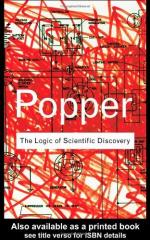|
This section contains 734 words (approx. 2 pages at 400 words per page) |

|
Science is Deductive, not Inductive
Popper is critical of those who follow inductive theory for believing that scientific theory starts with stray elementary perceptions. These perceptions are metaphysical and lead to infinite regression. They do not allow for explorations of the regularity of theories. A theory should lead to deducing more empirical statements than the number that can be deduced from the initial condition without the theory.
At critical junctures in each argument, Popper described how inductivists use a term, theory or process and why that approach is suspect. For example, the fact that inductivists see statistical stability as a fundamental law of nature not reducible to a simpler statement is for Popper a logically unacceptable tautology.
He is clear that deterministic positivist assumptions are not tolerated in his approach to probability. In particular, he takes issue with logical probability which relies on the proximity of theory to empirical...
|
This section contains 734 words (approx. 2 pages at 400 words per page) |

|




